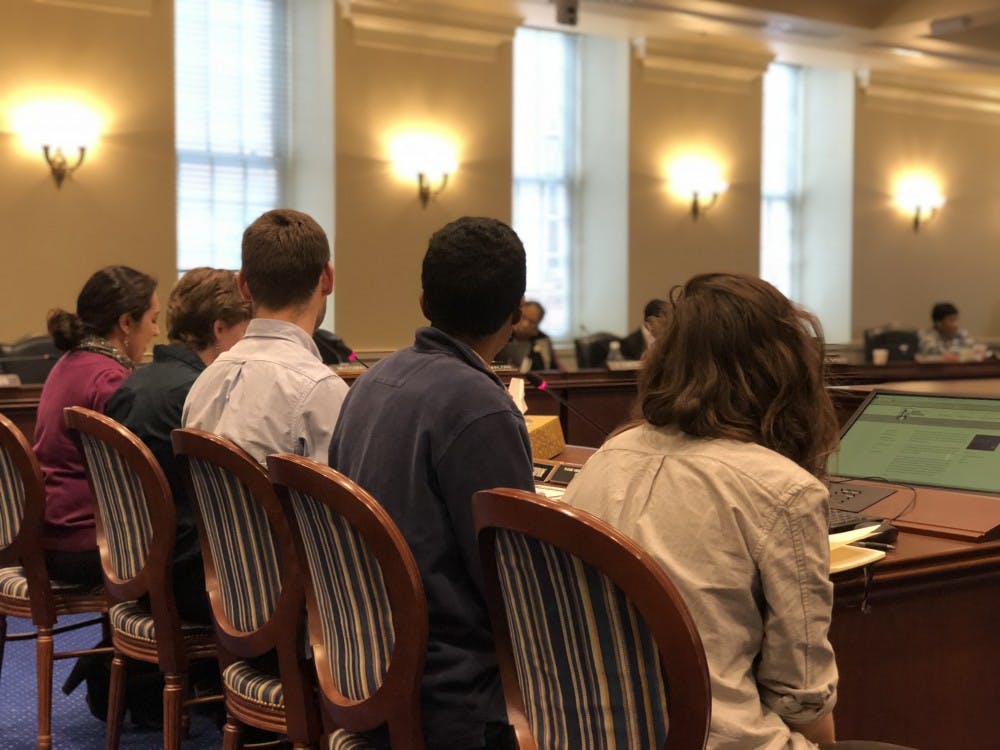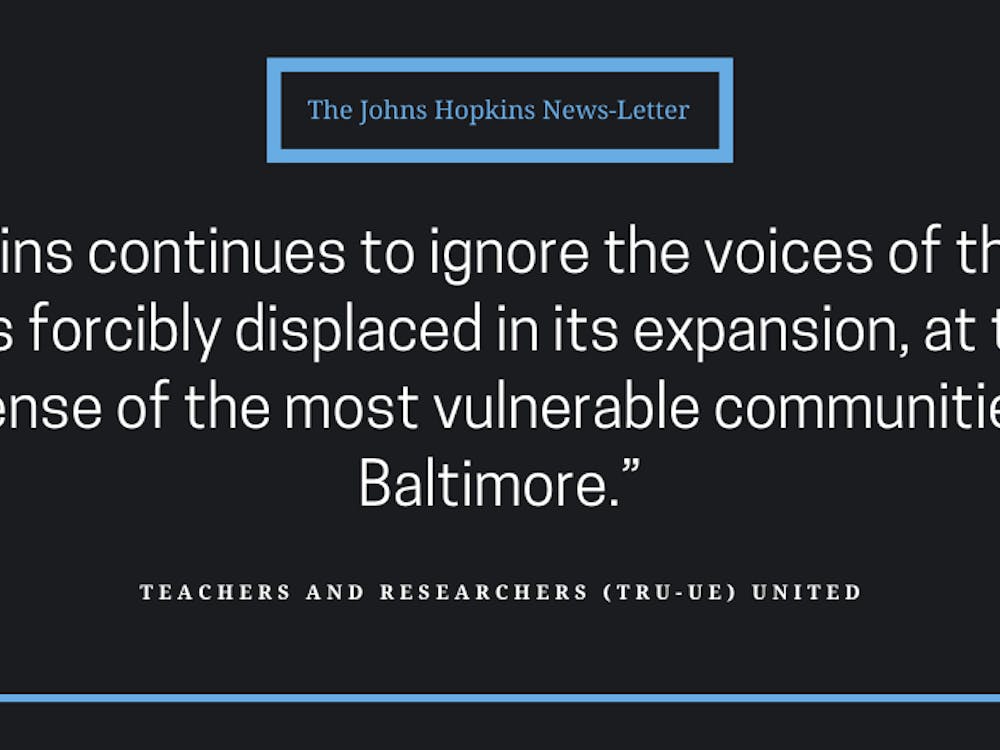Nine students testified at a hearing of the Maryland House Judiciary Committee in Annapolis on March 22 to express their opposition to a bill that would authorize the University to create a private police force. The bill was introduced by Democratic delegate Cheryl Glenn on March 5.
Hopkins announced its support for the bill that same day in emails sent to students, faculty, staff and community members.
Alina Spiegel, a School of Medicine student who testified in Annapolis, explained that she opposes the bill because she believes that the University rushed the process of introducing the legislation.
She said that more discussion was crucial to understanding the other options for addressing the problem of increased crime.
“Police isn’t an obvious answer to a safety issue,” Spiegel said. “That type of thinking is what has led us to over-incarcerate impoverished and black and brown neighborhoods in the United States, and so for a place like Johns Hopkins to do that is particularly concerning.”
University President Ronald J. Daniels spoke at a meeting of the Baltimore City House Delegation on March 16 to answer questions from Baltimore legislators.
He explained that the University decided to pursue the creation of a private police department in response to the increase in crime that Baltimore has seen in recent years. According to Daniels, Hopkins doubled its security spending from $12 million from $24 million in the last year.
“We have steadily increased our investment in traditional security measures. That means more security personnel walking the beat, more lighting, more cameras, more collaborations with community groups,” Daniels said. “It is an extraordinary investment in security, but we regard safety and security as a wellspring of everything that we do at Johns Hopkins.”
Quinn Lester, a graduate student in the Department of Political Science, testified before the legislature to express concern about the potential profiling of students of color and other members of the Baltimore community.
“A greater police presence in the communities around Hopkins property would have a marked increase in danger for students of color and non-Hopkins community members who would be actively surveyed, targeted and arrested,” he said.
Lester also criticized the proposed Memorandum of Understanding (MOU) with the Baltimore Police Department. An MOU functions as a legal agreement that outlines the relationship between two entities. They are often used between city police forces and university police departments.
“Private campus police forces would have even less oversight than municipal police, which would be very ironic at a time when the Baltimore Police Department is already under observation for it’s violation of citizens’ constitutional rights,” he said.
During his testimony Daniels emphasized that the University hopes to incorporate feedback on the proposal while drafting an MOU in the months following the passage of the bill.
“What the legislation does is set the way to have a discussion about an MOU, which can fully contemplate the kinds of transparency and accountability moments that are appropriate for the control of this power,” he said.
Senior Stephanie Saxton attended the hearing as a member of Students Against Private Police (SAPP), a group of undergraduates, graduate students and faculty that has pledged to research alternative community-based, restorative solutions to crime in Baltimore.
Saxton believes that the proposed private police force is an extreme way of addressing crime in Baltimore.
“We don’t deny that crime is a problem, but we want to look into this and research this rigorously before putting ahead such bold legislation,” she said during her testimony.
Senior Paul Watson also testified before the Committee. Watson believes that recent forums hosted by the University to address the proposal have not allowed for student feedback to actually be incorporated into the legislative process.
“Many students, including myself, felt that the forum was only for the administration to be able to say that they spoke to students, and to be able to say that they considered our input,” he said.
Spiegel said that the students who testified in Annapolis did so in order to make sure legislators listened to their concerns.
“[The hearing] is one of our main points of contact with legislators, and so it’s important for legislators, since they’re going to be hearing so many opinions from Hopkins administrators, to also have the perspective of the students,” Spiegel said. “I do feel like we were heard.”
Watson expressed concern about the lack of community input in the proposed legislation.
“I could not see how a state legislator would vote in favor of this bill in good conscience with the knowledge that the people it would directly affect had no say in its conception,” he said during his testimony.
Delegate Glenn, who introduced the bill, agreed that Baltimore City needs help addressing public safety. However, she admitted that the process by which the legislation was filed raised some concerns.
“Hopefully we can work together to make sure that we engage the community in a way that people can have meaningful input and at the same time all of us can be there, we can hear the same questions and concerns, and collectively have responses or find solutions together,” she said during Daniels’ testimony.
Andrea Fraser, a graduate student in the Department of Environmental Health and Engineering who testified, believes that the school’s failure to consult community members before proposing the bill contradicts the values of the University.
“I find it hypocritical that Johns Hopkins presents itself as an institution invested in the good of the public, while simultaneously undervaluing community input,” she said during her testimony.
Fraser also noted that according to studies, increased surveillance would increase crime in neighborhoods directly outside of the policed area. Fraser believes that a private Hopkins police force would not solve the issue of crime in Baltimore.
“I want Johns Hopkins to focus initially on building the culture required to sustain peace, instead of encouraging the stigmatization of greater Baltimore,” she said.
According to Spiegel, such stigmatization has been an issue for decades. She said the University built an apartment complex for its affiliates in the 1950s and surrounded it with a barbed wire fence.
For many, Spiegel said, the fence was a reminder of the hostile attitude the University held toward its neighboring communities.
“This police force is just essentially that same barbed wire fence except created with human beings that make the campus a more hostile place for the surrounding community,” she said during in an interview with The News-Letter. “The fact that Hopkins didn’t think to even solicit community opinions before deciding to create this police force makes that worry more real.”
Kenneth Feder, a graduate student at the School of Public Health, also testified in opposition of the bill. He believes that the proposed police force could damage the trust established between Hopkins, particularly the School of Medicine, and the Baltimore community.
“We’re a hospital. We’re a nursing school. We serve the community, and I worry that when Hopkins establishes its own private police department, it could strain this relationship because community members could be concerned that they could be arrested by the same University that is supposed to be serving them,” he said in an interview The News-Letter.
Feder believes that the potential negative consequences of the proposed private police force outweigh a potential of decrease in crime.
“They see it as a cost versus benefit issue, and they think that the benefits outweigh the costs,” he said. “My position is that the costs, both immediately tangible in terms of things like racial profiling and the risk of damaged relations with the community, exceed the possible benefits of reduced crime.”
According to Feder, granting private institutions policing powers is unethical. Since Hopkins students do not have the power to elect officials, Feder believes that the police force would contradict a principle of self-governance, in which authorities with policing powers are accountable to elected officials.
“I really believe that they do have every intention of doing this in a manner consistent with the values that the University establishes. But a private police force in and of itself runs directly counter to that value of self-governance,” he said.























Please note All comments are eligible for publication in The News-Letter.